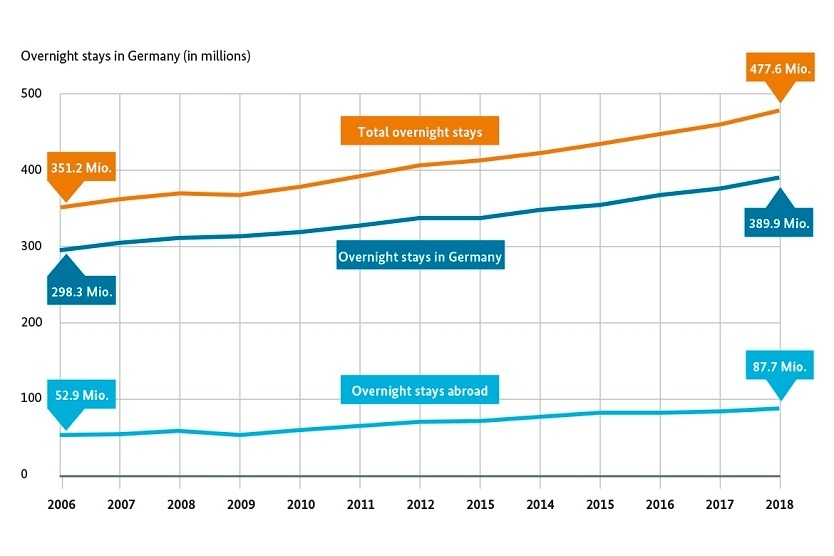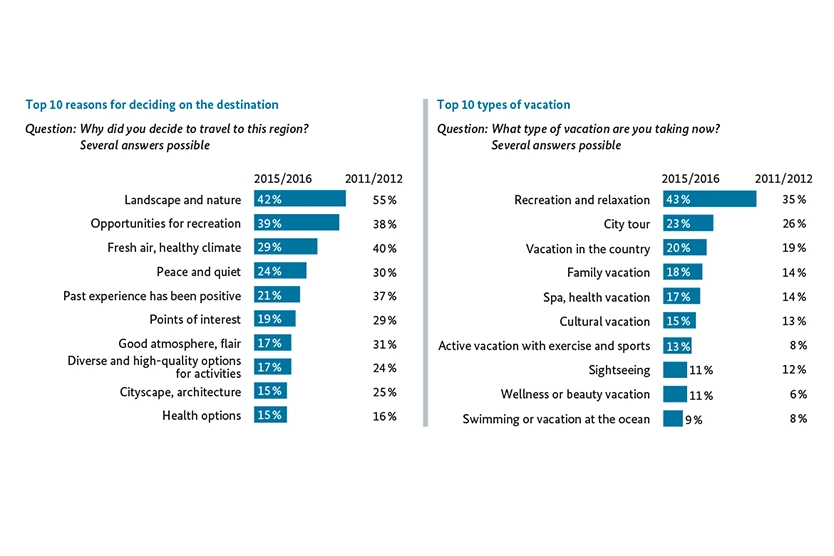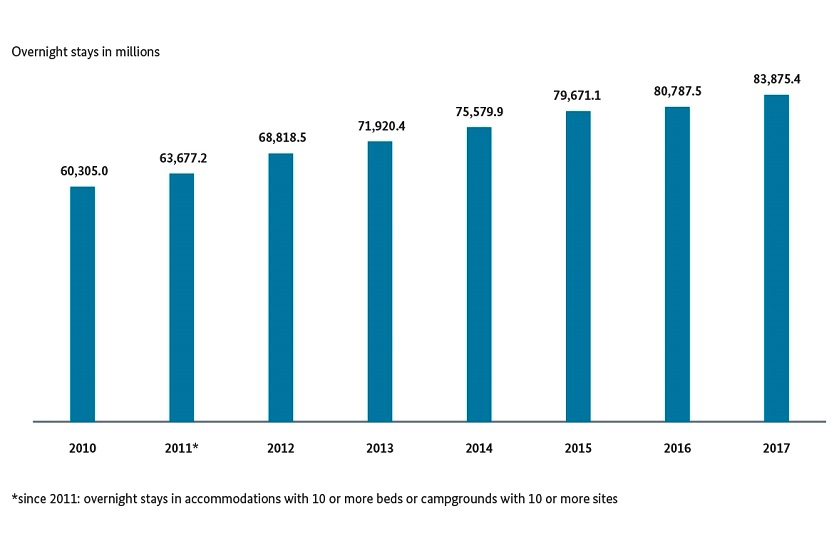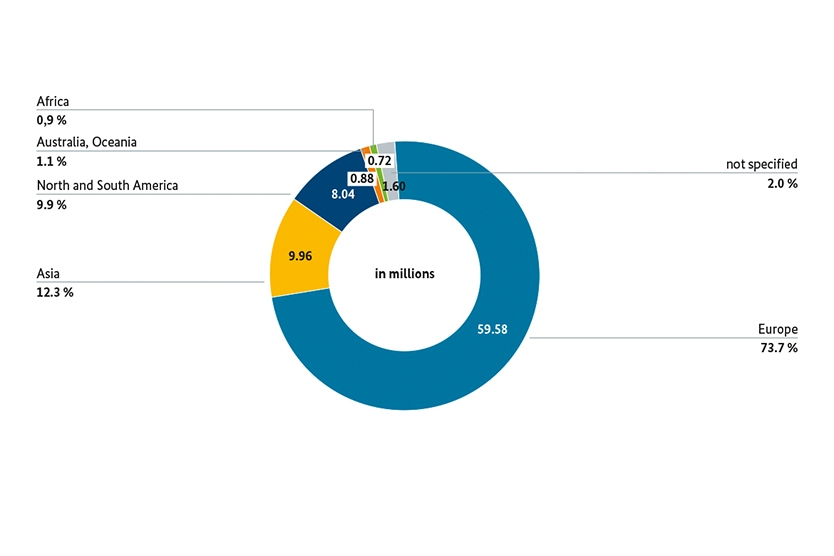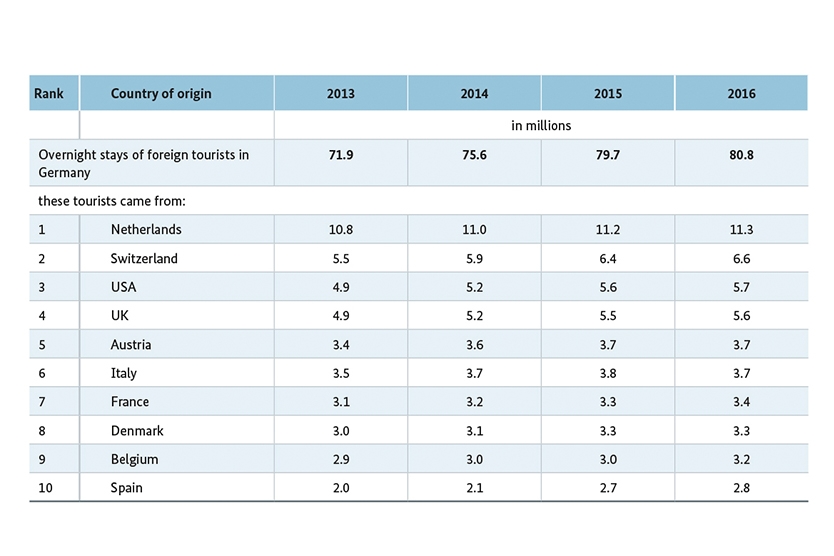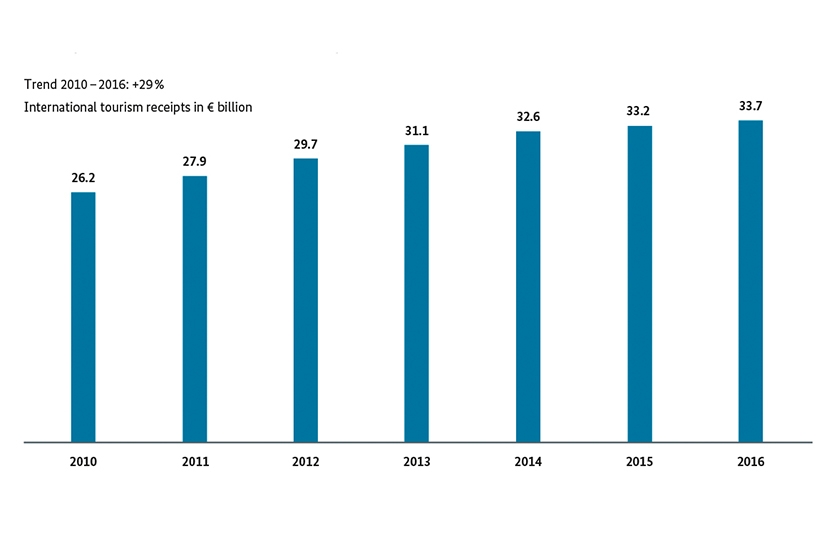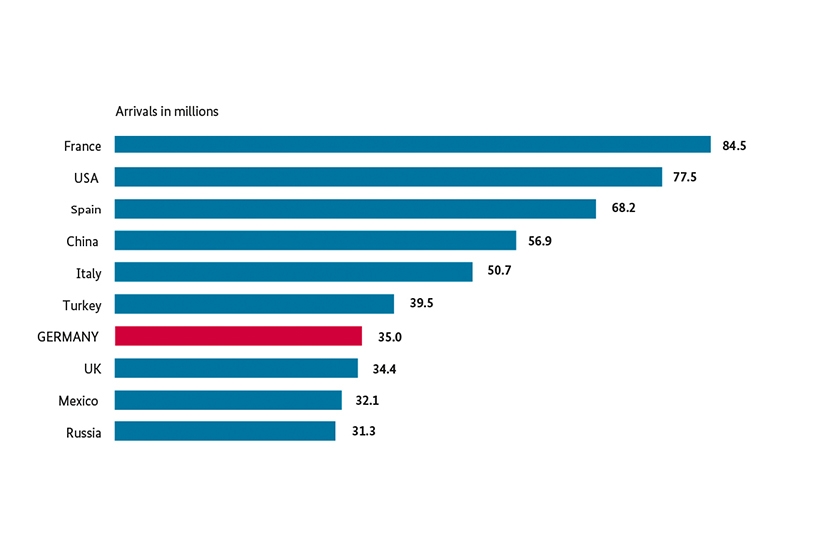Tourism is a major driver of economic growth in Germany, particularly when it comes to creating jobs and training opportunities, but also for raising and maintaining the attractiveness of Germany’s rural areas. Tourism can boost not just the hotel, restaurant and catering industry, but also a wide range of other economic sectors, such as the retail trade and the entire local supply chain, and it consists mostly of small and medium-sized enterprises. This is why the Federal Government is providing funding to promote Germany’s tourism industry. The development of tourism in the individual regions of Germany falls within the responsibility of the Länder.
Tourism is a cross-cutting policy field that has a bearing on many different issues. These include implementation of the EU Package Travel Directive, dealing with how trade tax is to be applied to certain travel services, and handling visa matters. Other important issues include the minimum wage, working and training conditions and digitisation, including the sharing economy. The Federal Ministry for Economic Affairs and Climate Action is engaged in continuous open dialogue on these questions with the tourism associations, which represent the many different aspects of the German tourism industry.
Commissioner for Tourism
As many aspects of tourism are important for the whole of the country, the Federal Government decided in 2005 to create the office of the Federal Government Commissioner for Tourism. The back then Federal Government Commissioner for Tourism, Thomas Bareiß, Parliamentary State Secretary at the Federal Ministry for Economic Affairs and Climate Action, serves as intermediary between policymakers and the many stakeholders within the tourism industry. He is a contact point for the tourism industry and its associations, and represents the Federal Government on tourism-related concerns in parliament, e.g. in the Bundestag Committee on Tourism (in German).
National Tourism Strategy
The federal cabinet adopted principles for a national tourism strategy in April 2019. The strategy aims to safeguard the success of Germany as a tourist destination on a long-term basis. Tourism is to be built up as a factor in the economy and the entire sector, in all its diversity, is to be prepared for the future as well as possible.
The national tourism strategy is oriented to three overarching policy goals: Firstly, domestic value added is to be increased, thus fostering economic growth. Secondly, the quality of life of the people living in Germany is to be improved on a lasting basis. Thirdly, tourism is to foster international stability.
To achieve these aims, the national tourism strategy is based on a two-stage concept. In the first stage, the Federal Government – assisted by numerous partners from commerce, policy-making and administration – drew up, discussed and fleshed out principles which were adopted by the cabinet. The Federal Government then formulated strategic goals for tourism policy to which future initiatives of all those responsible for tourism policy should be oriented. The Federal Government intends to develop an action plan for the defined fields of action in an intensive dialogue process with specific measures and draft recommendations for action by the stakeholders in the tourism sector.
The key principles of the national tourism strategy can be found (in German) here (PDF, 64 KB).
Advisory Council on Issues of Tourism
The Advisory Council on Issues of Tourism advises the Federal Minister for Economic Affairs and Climate Action and the Federal Government Commissioner for Tourism on issues relating to tourism. It consists of representatives from enterprises and associations of the tourism industry, transport companies, destinations and academia. Providing its broad range of expertise, it supports the Ministry’s decision-making process. The aim is to strengthen tourism in Germany and to improve the framework conditions for this purpose.
Federal Government Centre of Excellence for Tourism
In order to further strengthen government support for the tourism industry, the Federal Ministry for Economic Affairs and Climate Action has established a Federal Government Centre of Excellence for Tourism. The Centre of Excellence mainly supports the operational implementation of the Federal Government’s tourism policy objectives by monitoring and analysing economic, technical and social developments in tourism and in the sector. An important part of its work is the special module entitled Tourism 2030, which is seeing the Centre join together with the various players in the industry and with academics to look at long-term scenarios and prospects for tourism in Germany. The Centre of Excellence has an advisory board as a “sparring partner” and a supervisory body whose membership includes representatives of the tourism associations of national significance.
The LIFT funding programme
In the context of the programme entitled “enhancing performance & promoting innovation in the tourism sector” (LIFT), the Federal Ministry for Economic Affairs and Climate Action is as from 2019 providing funding for innovative project ideas that serve as a model to make small and medium-sized enterprises in the tourism sector fit for the future. The funding totalling €1.5 million serves to provide fresh impetus from within the sector, without putting a special emphasis on any specific issues or target groups. The Federal Government Centre of Excellence for Tourism selects particularly suitable projects and provides advice as to the implementation. You can find further information and details of the funding terms (in German) on the website of the Centre of Excellence for Tourism at Kompetenzzentrum Tourismus.
Marketing Germany as a travel destination
In order to ensure that the German tourism industry continues to thrive, it is important to market Germany as a tourist destination abroad. This task is undertaken by the German National Tourist Board (GNTB), which is located in Frankfurt. The Federal Ministry for Economic Affairs and Climate Action currently provides around €34 million in annual funding to the DZT. The DZT also receives funding from its current base of 67 members and 16 sponsors, which include companies within the tourism industry, marketing organisations and important tourism associations.
The goal is to attract an even greater number of foreign visitors to Germany and ensure that tourism will make an even larger contribution to the country’s income and job market. In order to achieve this goal, the German National Tourist Board runs offices around the world, where staff work together with local tour operators and local media in order to market Germany as a tourist destination. The DZT conducts in-depth market analyses and studies which help it to anticipate new trends and adapt its marketing strategies in a targeted manner to the needs of foreign holidaymakers and business travellers. The DZT also coordinates closely with a large number of German tourism companies in order to position Germany as a top tourist destination, right around the globe.
The German National Tourist Board also showcases Germany as a travel destination among tourism industry professionals around the world, organising a wide range of different events and campaigns, and providing many different services. These include participation in international tourism trade fairs, workshops and media events, which together serve as an important platform for marketing Germany as a travel destination. Travellers and organisations interested in finding out more can go to the DZT’s website and download special apps or join social networks in order to obtain information about travel destinations, programmes and tourist events taking place in Germany. This information is available in several languages.
In 2018, the DZT concentrated its marketing activities on the central theme of ‘Culinary Germany’. In 2019, tourism promotion is centring upon the centenary of the founding of the Bauhaus design movement. 30 years after the Wall came down, the increased range of tourism services throughout Germany will also be a key focus. In 2020, the DZT’s campaigns will be devoted to the 250th anniversary of Beethoven’s birth, nature in Germany and 30 years of German unity.




